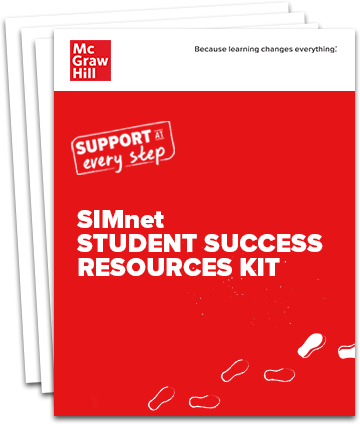- Learning Solutions
- > Support and Service
- > SIMnet
- > Beyond the First Day
Beyond the First Day

The first day is over. Now let’s conquer the rest of the semester. Here are some resources to support you throughout the term. And, as always, we’re just a phone call away if you want a more personal touch.
Student Success For You
Are you looking for ways to drive engagement and improve student success? If so, you’ve come to the right place.
Go ahead, check them out.
Download:
The Student Success Kit
Our downloadable Student Success for You kit includes easy to use templates to get you set up for success. Our email template allows you to copy and paste emails from course updates to assignment reminders. There are also resources designed to help students manage their time and be better test takers.
Download the kit to access:
- Email Templates
- Goal Assignment
- Time Management Assignment
- Post-Test Reflection
- Post-Test Do-Over Assignment
Download Full Student Success Kit
Articles:
We have hand-picked some student success articles just for you

Student Success For Them
Tired of answering the same questions over and over? Check out these resources that will help your students help themselves. Get ahead of your most commonly asked questions and get your students on the path to success.
Instructor How-To Resources
Have a question? No Worries. That’s why we’ve created a series of how-to videos and resources just for you.
SIMnet Intro Videos for Instructors
These videos are created for you to help you get started with SIMnet. Videos on this playlist include:
- Introduction to SIMnet
- Getting Started Best Practices
- Admin Settings
- Learning Assignments: SIMbooks and Lessons
- SIMpaths
- Project Assignments
- Exam Assignments
- Resources
- Admin Course Building Settings
- Setting up Instructor Users
- Building SIMnet courses
- Gradebook and Reports
- Digital Credentials
- LMS Integration with Blackboard
- SIMnet Licensing Overview
- Troubleshooting SIMnet licenses
More helpful resources at:
Just in Time Reads
We know how busy you are, so we’ve done the legwork for you.
Check out these just-in-time articles, and bookmark this page to keep an eye out for new ones!
Early-Semester:
Please Raise Your Virtual Hand: Increasing Engagement in an Online Classroom:
Peer to Peer Quick Tips
Our digital faculty consultants have shared their top ten mid-semester to end of semester tips.
Classroom tips:
- Embrace interactivity: It is often hard to keep students engaged toward the middle and end of the semester. Try doing some interactive types of activity each week in lecture to keep them engaged. For example, play a version of Heads Up where the students try to figure out which course concept or vocabulary term they are.
- Student videos- As an alternative to another written homework have your students create a video mini lecture on a topic or concept. Assign different topics to different students and put them together to make a reference for the class. Be sure to have them include a sample problem that they work completely. Their peers can grade the videos on correctness.
- Ben Franklin’s wisdom: “Tell me and I forget, teach me and I may remember, involve me and I learn.” Peer- to- peer learning is effective for helping students verbalize where they have problems with concepts. Pick a recently covered topic and have students line themselves up along the wall in the order that they believe they understand the material (let them rate themselves). Pair the students starting at the ends (100% pair with 0% etc.). Give each group a problem that they must explain to their partner.
Pre and Post Exam Tips:
- Pick a study method: Have students pick a method from the Scientific American article and commit to using it before the next test. Create an assignment or discussion board to show students’ commitments. After the test, ask students to think about the effectiveness of the method.
- Have them write a practice test: In groups of 3-4 assign students to write their own test questions with solutions. Compile the questions into a practice test they can use to study. For extra motivation tell them that 1-2 questions will be used on the final.
- Setup mini self-tests in your homework system. Creating these mini practice tests in an online homework system gives students the opportunity to practice working questions. Students should take these without using their notes to assess their level of knowledge of the material.
- Post exam reflections: Have students write their name on a note card and answer 2 questions: 1) Were you satisfied with how you did on the exam and/or how you studied for the exam? 2) Have you followed through with your study plans for your next exam?
This shows them that often we make plans to change behaviors for the better, and might start out doing such things, but the follow through is often lacking. Remind them that there is still time to enact change, but that they need to be aware of what they are/aren't doing.
One-on-one Tips:
- Alternative office hours meet them where they are: Try holding office hours in the Student Union or a café and be open to meeting with groups of students. The key thing is that your location is advertised so they know where to find you. While online office hours are primarily for online classes try online meetings for students who can’t make it into regularly scheduled office hours.
- Break it down: Language is a powerful tool. Work on building students’ confidence with small vocabulary changes. If a student says “I don’t get it” help them verbalize the specifics such as “I don’t understand fractions” or I don’t understand the context” being able to identify where they encounter problems slowly aids in building confidence when they see that it is not everything that is confusing but only a small part that is causing problems.
Ending the Semester Tip:
- Look ahead assignment -One of the worst thing students can do at the end of the semester is leave all that knowledge behind thinking it has no application to their future endeavors. Instead, have students imagine how they can apply their new knowledge and skills to their futures—both in future classes and beyond. It may be about the course content, or it may be about how they learn or work with new information. As a variation, consider asking students to write to you a few months later with an update.
Do You Prefer to Talk it Through?
Sometimes that makes things easier. Reach out today and get the support you need.
